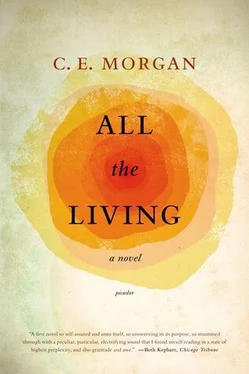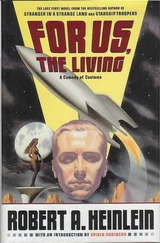Shoot, he said. That old place? And she saw the play of his thoughts so clear it was as if his head was split open for display and he went to speak but stopped so he stuttered, a grin spirited his face. He only said, That ain’t too big a place.
You can’t see all the land from the road, she said.
Well, huh, he said. Maybe. Still, I’d not want no bottomland like that’n. My papaw lived out Sunday Holler — you know where that’s at, when they had them rains back in… Shoot, I can’t turn up exactly when all it was, but they was washed out and when that big slurry come down the mountain, they swimmed out on bedsteads and barrels—
It’s plenty big for me, she said and he said, Well, is that right, and his lip pouched out, interrupted from his tobacco. She smiled a downcasting apology, jiggled her keys from a fingertip. Then he swung into his seat and said, Hup, like his truck was a horse and he started up his engine hard, gunning. Well, come and catch me if you can, he said and he drove as fast as he had promised. She followed him down the winding creek road and out 52 where the mountains flattened to a hazing blue in her rearview. They pulled into a gravel drive and passed two white trailers and a two-story house, behind it stood a new gambrelroofed barn. The man parked backward with the bed of his truck facing the shadowed barn interior. Once out of his truck, he turned her way and made a show of stretching so his shirt pulled up. She saw the furring line of hair below his waist. He looked at her as she slid out from behind the wheel and he grinned, nodded as if she’d said something he liked, then he turned into his barn, reaching back once to pat his worn Skoal ring. Up in the mow, he found his cages, which he handed down to her and then he half slid, half jumped down and in a flurry, he wrestled a few hens, checking them first and choosing which to keep and which to discard, holding each one up toward Aloma and giving each a little prize shake so they squawked in alarm. Watch yourself, darlin, he said and then he battled them into their cages — rougher than he needed to, she thought — and they fought with their scratching skinny legs and their hateful eyes until seven were caught and caged.
Glad to be shed of em is what, he said when he was done. Them’s good layers. I just got too many of em. He wiped his hands on his jeans. I ain’t got time to mess with no chickens and I can’t even eat no eggs. Makes me ill. And ain’t nobody round to eat em ’cept my old granny, he said and he winked with both eyes again, the one lagging fractionally behind the other. Ain’t a body here, he said again. Not a one, not a one. I ain’t got a thing to have.
She surveyed the land behind her out the broad door of the barn. She could see the border fencing in two directions, but she said, Yeah, but you’ve got a real big place, and he gave a whooping laugh, a dilute rebel chirp, and said, You are right. You are right. She got herself a poker face, but she calls it like she sees it. Then, with the chickens loaded into cages and the cages loaded into the bed of his truck, which Aloma saw now was jacked up a little higher than was really necessary, they rolled out of the farm. Aloma followed him again as he led the way back up 52 and down the winding roads to Burnt Ridge. And as they rolled up the gravel of the drive, his truck raised two horsetails of dust. Little blossom-white feathers fluttered out of the bed of his truck and up and over Aloma’s truck. When they crested the drive, Aloma saw Orren appear on the front porch, one hand raised to his eyes. Nearing the house, the man leaned out of his driver’s-side window and looked back at her, grinning, and Aloma waved for him to stop instead of continuing on down to the barn. He parked, but when the man suddenly saw Orren he did not turn off his truck but left it puttering in neutral, sat there for a moment, spat once, looked back at Aloma once, and then stepped out and put his hands to his lean hips.
Haddy, said the man, his voice saltless now, and Orren only nodded at him and they both looked at Aloma, at each other once more, and then at the chickens.
I bought you new chickens, Aloma said, leaning against the front bumper of her truck. New used chickens.
I sold em to her, the man said, trying unsuccessfully to look at both of them at the same time, his eyebrows working. Orren stepped down off the porch with his hand out. Orren Fenton, he said.
Caudill, Chris Caudill, he said and they shook. I just… He made a vague gesture in Aloma’s direction. I got a place out… 52. Now them hens… Now, a couple them’s bantam and I don’t know if you was wanting em, but—
Size don’t speak to strength, said Orren.
The man cleared his throat. Now, no, he said.
Did my wife make you come out all this way? said Orren and Aloma looked at him hard from where she stood, but she bit her tongue.
Well, said the man and he cleared his throat. Then he palmed his forehead for a moment and looked vaguely surprised as if he hadn’t expected it to still be there. He glanced at his truck. She ain’t had no cages to hold em. She ain’t wanted no chicks neither, just growed hens. Now, I sold em to her.
Well, sorry for your extra trouble, said Orren. I had no idea whatsoever she was fixing to get hens. The man just shrugged with both shoulders and together they unloaded the cages from the bed of the truck and set them on the porch, the chickens fretting, some of them winging up to batter the tops of the cages, rattling them. When they were done, Orren patted around in his pockets for a few spare dollars, but the man just held up his hands and said, Aw no, we’re level. No need. You just park them cages at the feed store and I’ll fetch em when I’m able.
I apologize for that, Orren said again.
That ain’t no problem, like I said, said the man. And he turned to go, but then paused and looked at Aloma for a moment, both his eyebrows raised and one half of his mouth curling into a brief puckish grin and Orren saw it and Aloma straightened up, pleased. Orren crossed his arms. Aloma said, Thank you again for driving all the way out here for me. I really like your truck. Orren, she said with a dumb small smile, do you think we could get one that big? And Orren just looked at her without blinking and the man grinned and said, Bye now, and got in his truck and drove away, gunning once and then again. Orren watched her watching him go.
That was right fucking cute, he said.
Yeah well, she snapped, don’t call me your wife till I am your wife, and then she stalked past him onto the front porch. When she reached the door, he said, Where’d you get the cash at for all these hens?
From playing piano, she said without turning around, and not seeing the look on his face only heightened the satisfaction of knowing she had taken him by surprise.
He did let her feed the chickens again. She knew he would. He was tight-mouthed for a few days, but when she went ahead and walked to the barn one morning, checking the feed compulsively with her hand to make for certain it was dry, he did not stop her. They didn’t speak of it again. She had bought the chickens, after all. They were now hers to kill.
She did not even realize that the first week of September had arrived until Orren announced to her one morning — his relief convenient to read in the easing of his brow — that he’d always liked a first harvest to usher in the fall and she looked to their kitchen calendar and saw that it was so. Three months had passed since the day she had arrived with her boxes of scores and her white nightgown in its paper catalog packaging, a brown bag she had folded and saved in one of Emma’s upstairs drawers. Her nightgown had now been laundered many times. The white ribbon that twisted and tied in a bow over her breasts was frayed and slightly yellowed.
Читать дальше
Конец ознакомительного отрывка
Купить книгу











